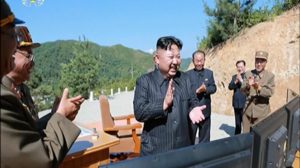Amateur neocons are demanding that Donald Trump stare Kim Jong-un down in the hope that the North Korean leader blinks first in the high stakes nuclear game. But what if Mr Kim doesn’t? What if he refuses verifiable denuclearisation? Would the US really launch a strike on North Korea? Who assumes responsibility for a conflict that would, in US defense secretary Jim Mattis’s stark warning, be “catastrophic”?
Last month, Mr Mattis, a distinguished retired army general, told American congressmen that if it came to war with North Korea, the US and its allies would eventually prevail, but at a terrible cost. “It will be a war more serious in terms of human suffering than anything we’ve seen since 1953.”
No sane person can contemplate such a horrific possibility without hoping for an alternative. Like a porcupine, the North Korean regime is shaking its quills and bristling to ward off external threats. Like an elephant, Mr Trump’s America is lumbering into the stand-off, insisting on respect and compliance commensurate with its strength and size. This is an unequal fight, but the weaker party has the advantage.
No one but the neocons believes that Mr Trump should dare Mr Kim to do his worst. In the most casual and cynical argument for war possible, the historian Niall Ferguson recently advanced the following bromides: “Is military action risky? That’s a stupid question. Military action is always risky, and Mattis is right to warn that a new Korean War would be highly destructive. The right question is whether or not the risk of inaction would be greater.”
The greatest of inaction would be that North Korea will get to the point it can fit nuclear warheads on its missiles. That is hardly surprising. According to Jeffrey Lewis, director of the East Asia Nonproliferation Program at the Middlebury Institute of International Studies, “the North Koreans are fairly good at this, and why shouldn’t they be? Nuclear-armed missiles are a 1950s-era technology.”
Anyway, nuclear-armed missiles will make the regime invulnerable, except possibly to the forces of inevitable change over time. These would include people power, market forces, and/or active Chinese displeasure.
While it is hardly desirable that a ruthless, paranoid, undemocratic and unaccountable leader acquire nuclear capability, a solution does not lie with the US. In fact, the best way forward is for the US to get out of the way and allow China to manage the situation. Funnily, this is exactly the strategy that Mr Trump had suggested years before he ran for office. As a private citizen, he argued that the North Korean affair was for China to handle.
As US president, he should heed his own advice. In his new book A World in Disarray, Richard Haass, president of the New York-based Council on Foreign Relations, makes the exact same case. It is time, he says, for the West to acknowledge the South China Sea is China’s theatre. North Korea is China’s responsibility and it can manage it however it wants. It can keep it in a state of frozen bellicosity as a hedge against US-ally South Korea. Or groom a more pliable replacement for Mr Kim and delicately achieve change of a sort in Pyongyang. Or it can allow the Korean peninsula to re-unify, though that is not an option Beijing seems prepared to countenance now or in the foreseeable future.
By giving China agency, chances are that war will be averted because Mr Kim is unlikely to embark on a suicide mission without reason. As lead manager of the situation, China is unlikely to provoke its belligerent ally. If the risk of inaction is an imperfect peace, that is an unbeatable deal.


